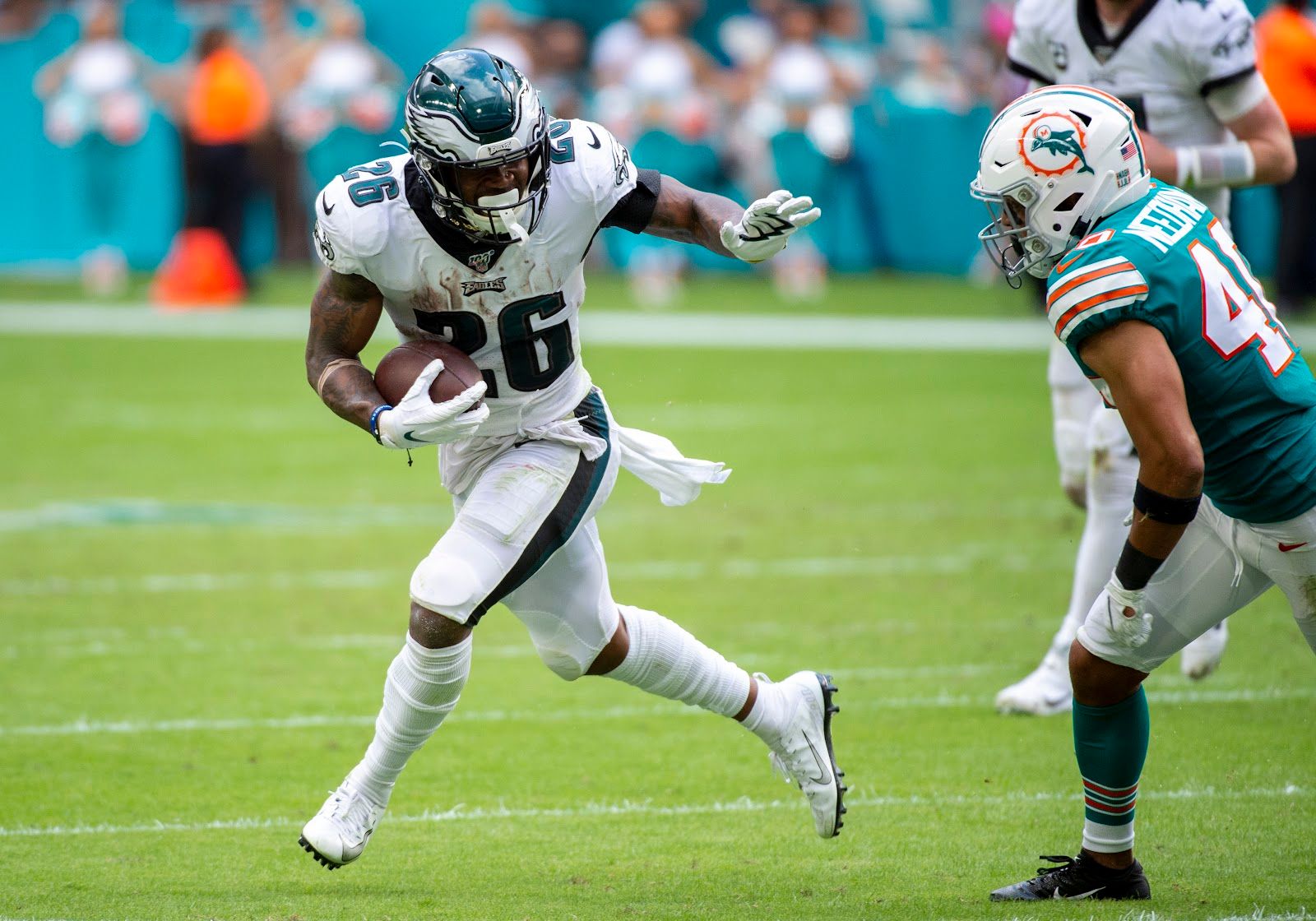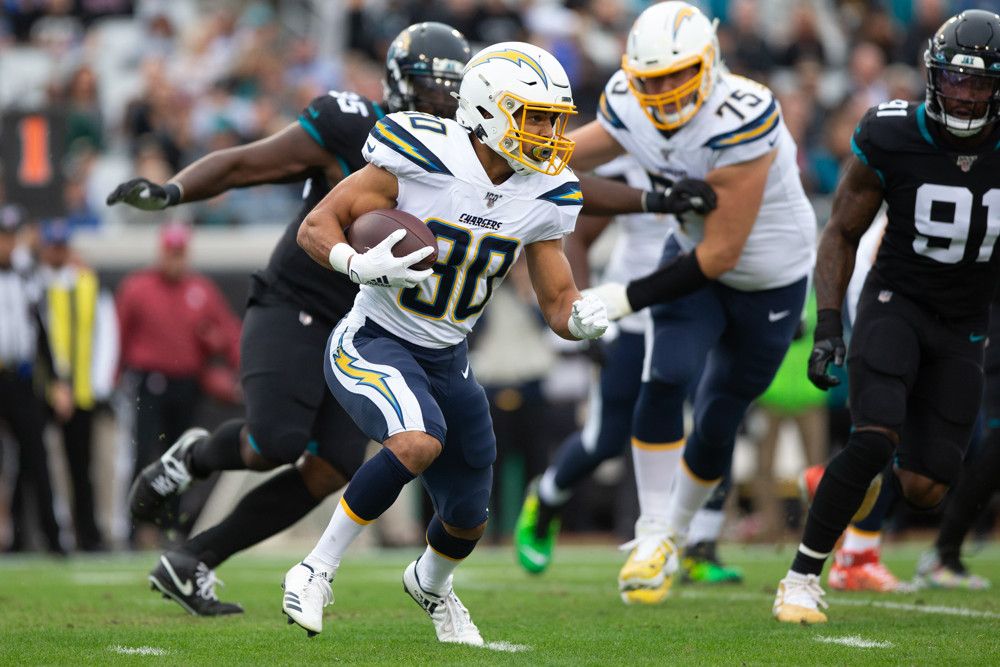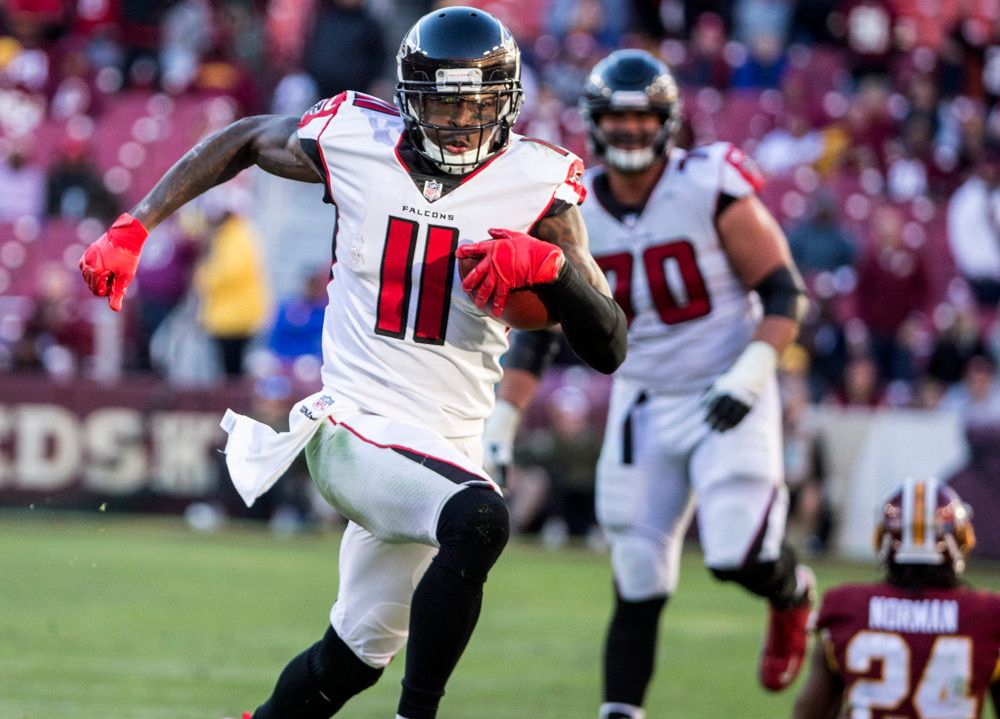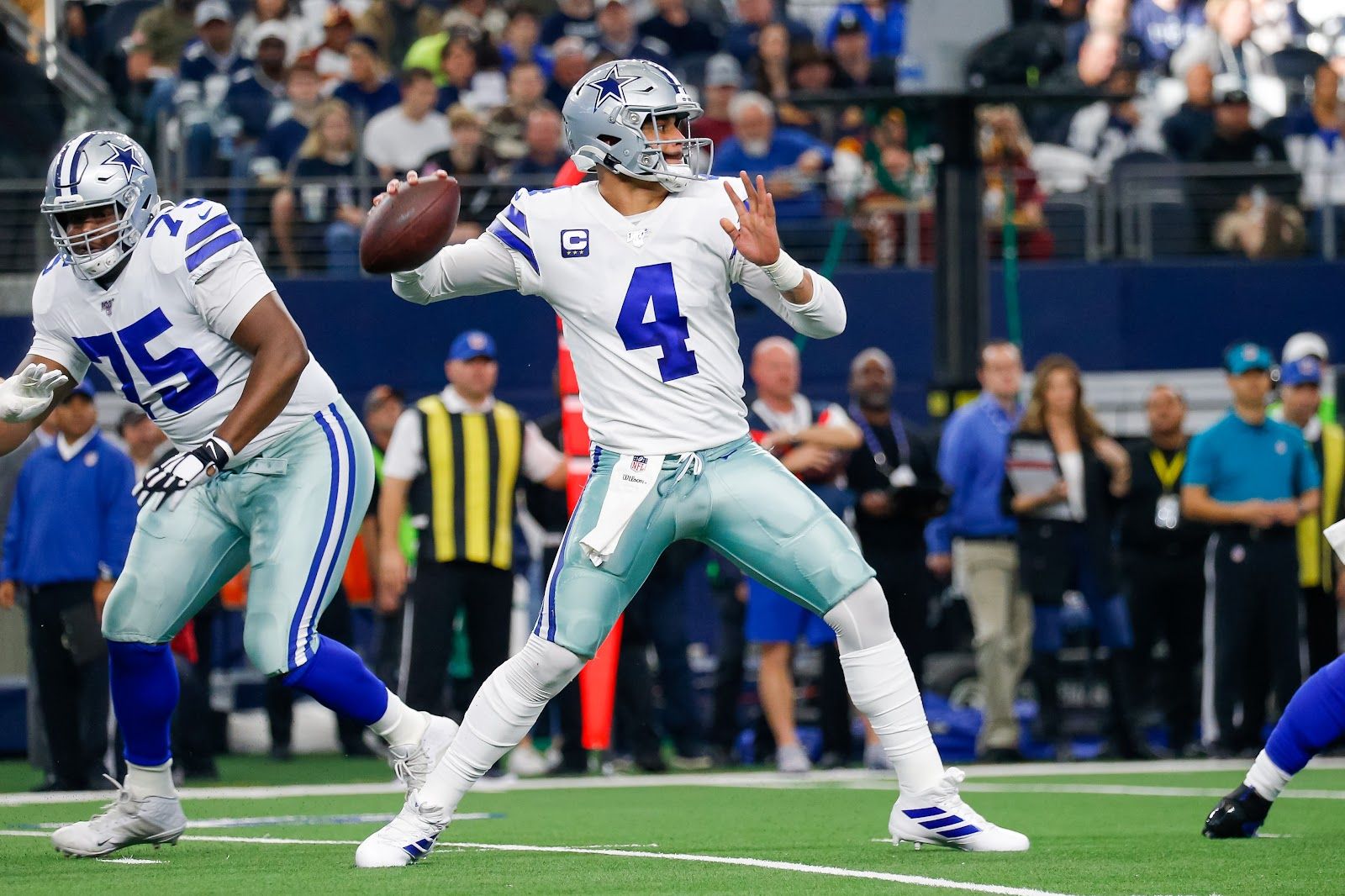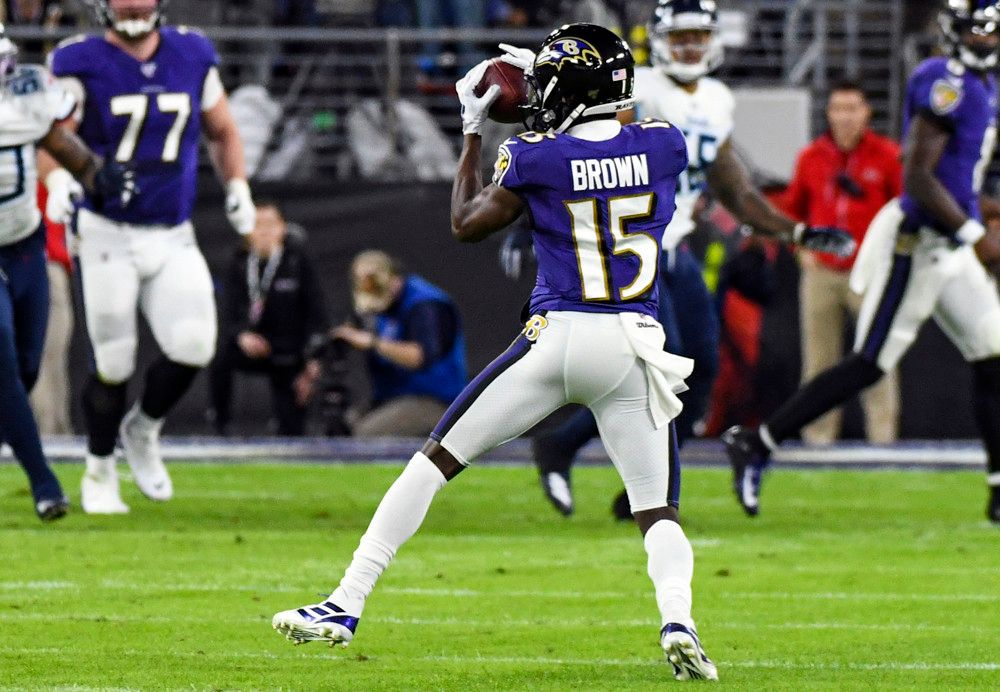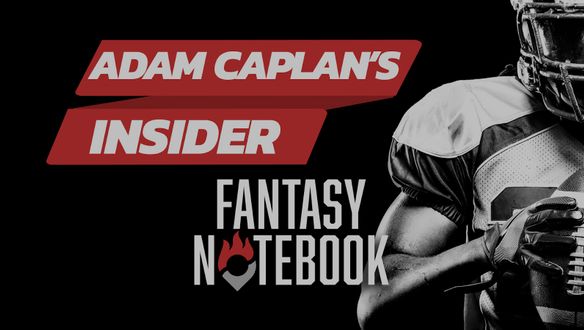Here’s an inside look at the FantasyPoints.com Dynasty league team (what I was thinking, the information I had, and why I made each selection):
For this type of format (we get to keep all 19 players drafted, though we’ll have to drop five players after next year’s rookie draft--assuming we make a pick in each round), I wanted to put together a roster that I’ll be keeping for years to come. I was going to treat this more or less as an expansion team (with a few exceptions) since we were drafting from scratch, with an eye on the future. I was going to treat this like how an NFL team drafts: teams that win don’t draft just for the season ahead; they’re drafting for 3-5 years out.
In the first few rounds, particularly the first round, I want to take players off my board or reduce my list of those who have issues. One of the mistakes I made last year when I selected Joe Mixon in all 6 leagues was that I ignored too many negatives: bad team, bad defense, bad offensive line.
Sure, Mixon was mostly great over his last 8 games, but he really struggled badly in most of his first 8 games. It was very hard to watch him, but it wasn’t his fault. He had so much going against him (see my list above for the negatives). I thought he could overcome the challenges presented, but I was way off. I’ll take it as a learning experience (or one of Hansen’s “Lessons Learned”). I rarely draft the same player in more than half of my leagues, so I’ll make sure that I don’t do that again. The saying “diversify your portfolio” is a mantra I will use again (I have plenty in the past, but for some dumb reason that got lost on me).
I typically do a good job of identifying issues with players (I will do my best to point out issues with each player that I have intel on for our FP subscribers so you’re prepared going into your drafts. I did some of this on our “Pow-Wow”), but I ignored too many of his challenges. He’s very gifted, but you have to understand talented players can only overcome so much. You won’t lose your league because one player didn’t do as well as you projected him to do (I’ve played in roto/fantasy football leagues for 30 years and never lost because I got my first-round pick wrong), but it’s harder to overcome when it’s your first-round pick. Meaning you’ll need other players to play above their expected production, which isn’t always easy to identify. You can make it up elsewhere (we’ve all done this) with good mid-to-late round picks.
So, let’s get started…
1.08: Miles Sanders (RB, Phi)
He fits in my criteria of identifying talented players in really good situations:
Very good to great play-caller (HC Doug Pederson).
Pederson is recognized by his peers in the NFL as one of the top play-callers. During their Super Bowl run in 2017, from talking to other teams, no team had better-called games than the Eagles.
And from talking to coaches and execs from Eagles opponents over the years, I can tell you that they think Pederson is one of the top play-callers. That’s good enough for me (they’re basing it mostly on tape study, which is hard to challenge). It’s hard to blame him for the Eagles struggles at WR last season (two starters got hurt, #3 WR had a bad knee, and they had no one who was ready behind them). And Carson Wentz was mostly working with street free agents and practice squad players for the final quarter of the season.
Not expected to be in an RBBC.
I’ve explained this on a show that I host with Geoff Mosher, Inside the Birds. This is a true insiders show; the information we use is based solely on sourcing from credible people and we base our reporting and opinions on information that’s been vetted before we go with it. So when I said only our show last season that the only reason why Sanders was in a timeshare with Jordan Howard was because they didn’t think he was ready to take over full-time (Sanders somewhat surprisingly won the starting job coming out of the preseason--he missed almost all of their offseason due to hamstring issues, but was demoted in Week 2 at ATL after missing some assignments). He was mostly in a sharing role after that until Howard got hurt, though he had a few really good games during that time.
After Howard suffered his stinger injury, Sanders took off and as our Greg Cosell can attest to (listen to him speak about Sanders’ tape), he never looked back and was the player they thought they were drafting in the 2nd round. In fact, Sanders was the one player in last year’s draft class that everyone with the Eagles who had seen his pre-draft tape could agree on; they thought he had the chance to be special.
By the way, no coach says, “Let’s go with a committee even though we have a special player to lead it.” I always get a laugh when people fall for this.
Coaches decide what the rotation will be based on the players they’re given at the position, period.
Beginning when LeSean McCoy became the Eagles full-time starting RB in 2010, he averaged 21.16 touches/game over a 5-year period (before being traded to the Bills in 2015). The myth that Andy Reid (2010-2012) or Chip Kelly (2013-2015) wanted to use a committee approach was not factual and was easily debunked.
For those who said Reid preferred an RBBC (I’ve heard from some of you over the years), Brian Westbrook still had several huge seasons with total touches per game (2004-19.1, 2005-18.1, 2006-21.1, 2007-24.5, 2008-20.5). Keep in mind Reid took an RBBC approach only when he had Duce Staley, Correll Buckhalter and Westbrook together in 2002-2003 until BWB was ready for a full-time role in 2004. BWB had to build his body up physically and once he did, his career took off in year three. Sadly, because of issues with his surgically repaired ACL that goes back to his time in college, he couldn’t sustain his high level of play past 2008 and his career was over after the 2010 season.
With McCoy, he didn’t share the ball simply because he was an elite talent, and Sanders is viewed around the NFL and the Eagles the same way.
I get a good chuckle when people say I reached in a dynasty league for Sanders. My response would be, “what are you basing it on?”
And please don’t trust what coaches say publicly. If that’s what you’re using for your argument, be careful. What coaches say to the media and what they say privately are often two different things (this is where I come into the picture for FP subscribers).
It’s rare, and I mean very rare, that a coach will be 100% truthful when giving an evaluation of a player or players on the record or about what their role will be (and sometimes they don’t know at a given time because they don’t have enough information). In covering the NFL for now 21 years, I can’t tell you how many conversations I’ve had with coaches who tell me one thing privately and say something slightly or completely different to the media. As you’re well aware, the coaches want to be as positive as they can be on the record to avoid any issues or conflicts (especially if the GM and HC or OC or DC don’t agree on a player).
Will run behind one of the NFL’s best OLs
The Eagles easily possess one of the NFL’s best offensive lines, which I can’t imagine anyone would disagree with.
He’ll have plenty of room to roam and shouldn’t have any issues with getting hit behind the line of scrimmage.
Other considerations (players available at the time of my selection): Joe Mixon
2.05: Austin Ekeler (RB, LAC)
I struggled with this pick, especially after the two players I wanted before Ekeler (Tyreek Hill and Chris Godwin went off the board right before me).
You wouldn’t think I would take long to make this selection after the season he had in 2019, but I’m concerned with a few issues/situations:
OL: It’s a major concern.
It was one of the worst in the NFL last season. I asked some NFL execs who studied the Chargers tape last season what their thoughts were and two guys said it was one of the worst they had graded. While Ekeler had a great season, he did it almost all catching the ball (108 targets, 92 receptions, 8 TDs). He was nothing special on the ground (557 yards, 4.2 attempts, 3 TDs) and the tape showed it. Out in space catching the football, he’s terrific; but thinking he’ll post similar target numbers is questionable.
Is this type of production as a pass-catcher sustainable? He averaged fewer than 3 receptions per game in 2018, so the question then becomes: was 2019 an aberration?
Change in QB
Not every pass he caught was designed. He was the outlet on many plays, especially when the play broke down. And QB Philip Rivers clearly trusted him. But will that change with Tyrod Taylor?
Maybe I’m over analyzing this one, and he’ll be a fine #2 RB, but I don’t love this pick.
Other considerations: Patrick Mahomes, Kenny Golladay
3.08: Julio Jones (WR, Atl)
I was going to go with Cam Akers here (especially considering we can start 4 flexes), but after he went off the board, I had to reconsider the game plan.
I really want to draft players at RB and WR who are 4 years or less in their careers because this is a dynasty league draft and especially if they’re my #1 at those positions. So it really came down to Jones, arguably the NFL’s best WR and a lock for huge yards and reception numbers but who doesn’t fit my profile of a younger player, or taking a QB (I wanted Kyler Murray or Dak Prescott badly to be my QB for years to come). Since I believed I would be able to draft one of those guys if I waited another round, I went with Jones here and I’m banking on huge numbers for at least 2-3 more seasons from him.
Other considerations: Kyler Murray, Dak Prescott, Allen Robinson
4.05: Dak Prescott (QB, Dal)
I was super pissed after Murray went off the board (he’s on my super team list that I’ll post in the coming weeks) and I was getting very nervous that someone would draft Prescott right in front of me--thus killing my QB plan--but thankfully that didn’t happen. I was going to go with a QB way later if I didn’t get Prescott here. In a re-draft league, I typically won’t take a QB until at least the 7th round, but in a league where we will keep these players for a decade or longer if we want, it was a no-brainer taking Prescott here. Now, as Hansen said after he grabbed Mahomes, he doesn’t have to worry about having a QB for the future. I feel the same way about Prescott’s role for my team.
Prescott has no real concerns. There’s nothing you can do about his lack of anticipatory throws. It won’t change. If he would throw guys open, you’re looking at a potential 40-TD season, but I’ll be happy with low to mid 30s (throwing+rushing).
So far, I’m off to a good start, but it could be better.
Other considerations: None.
5.08: Marquise Brown (WR, Bal)
I wanted D.J. Chark (went 3 picks before me) or Brown here, so I’m thrilled that I was able to add either of them.
Brown played hurt virtually all last season (he came back from LisFranc surgery earlier than expected and probably too early) and clearly wasn’t himself, but when his foot allowed it, he put together some intriguing tape and is a very talented player. He’s super explosive and has a strong upside.
He’s on my list of players I want on my “Super Team” for the future as my #2 or #3 WR (with major upside).
Other considerations: None.
6.05: Darius Slayton (WR, NYG)
Like Brown, I want this guy in any keeper or especially a dynasty league as a building block, but it’s hard to evaluate where to select him. Because I don’t know many of the guys in this draft in terms of their selection habits, I wasn’t sure how long I could wait on Slayton. I didn’t want to regret waiting another round (as I would later learn, these guys are really sharp).
Slayton is an interesting player. I asked some WR coaches why he dropped to the 5th round and their responses were: needed to put on weight, didn’t run a lot of routes, didn’t have a lot of production. All true, but that changed once he played for the Giants.
While he had a quiet training camp and was an inactive the first two regular season weeks, Slayton took off a little in Week 3 (3-82 @TB) and went on to post 12 plays of at least 20+ yards and 3 of 40+ yards last season. He also finished with 8 TDs and also showed that he’s not just a “9-route” runner.
I also like that Daniel Jones is an aggressive deep ball thrower and the two second-year players already have started to develop good chemistry.
And Slayton is the only true vertical WR they have and he’s the one they have in the top-3 of the rotation who can consistently play outside.
Other considerations: Henry Ruggs
7.08: Zack Moss (RB, Buf)
In order, I targeted Michael Gallup and Ke’Shawn Vaughn (went pick before me), so I went with the next best young RB on the board with Moss.
Moss should be involved very early in the season and it’s not out of the question that he cuts into starting RB Devin Singletary’s role.
Read more about Moss in Graham Barfield’s Yards Created.
Other considerations: None.
8.05: Laviska Shenault (WR, Jac)
This was another “I want this guy on my dynasty super team for the future” pick.
A favorite of many NFL offensive coaches, Shenault might be the most gifted rookie WR, but he fell out of the first round due to injury concerns.
Because I’m building for the future, and less about this season, the talented rookie is perfect for the role that I have in mind for him, which is to be one of my 4-6 starting WRs in 2021 and beyond.
The two concerns, however, that he has is the possibility of the Jaguars staff being fired after this season and his injury issues coming into the NFL. So while he’s extremely gifted, there’s a reason why you should let him slide to the middle of your draft in a dynasty league.
Other considerations: T.J. Hockenson.
9.08: Hayden Hurst (TE, Atl)
I had 6 TEs targeted in this draft and Hurst was one of them. And I was not going to overpay for any of them. This was a very deep TE class, so the feeling here was there was value later, which certainly proved to be correct as late as the 9th round.
Hurst will be no worse than their 3rd passing option most weeks in what NFL people believe is an upper-echelon passing game.
By the way, I targeted Darren Waller, Breshad Perriman, and Hurst in this round.
Perriman was outstanding after being pressed into service with the Buccaneers and turns just 27 in September and Waller has a lot of upside and is a matchup nightmare for LBs.
Other considerations: Carson Wentz.
10.05: Robby Anderson (WR, Car)
In this round, there were no other considerations for me. I was going to select Anderson, who is one of the NFL’s best deep threats, here.
I do like that he’s going to be playing in an up-tempo, progressive passing game in OC Joe Brady’s system, and Panthers HC Matt Rhule coached him in college.
My one concern is his injury history (has a history of playing through a lot of lingering injuries), but he did play in all 16 games last season.
Other considerations: None.
11.08: Dawson Knox (TE, Buf)
I wanted to add Bryan Edwards (who went off the board right before I selected) or Knox in this round.
Edwards would be on my “Super Team” list for the future due to his talent and size, but he also has some injury concerns.
You can read my analysis on Knox and Irv Smith right here.
Other considerations: None.
12.05: K.J. Hamler (WR, Den)
Hamler, one of the elite deep threats at WR for this year’s draft, will play mostly in the slot for the Broncos. He’ll likely be used mostly as a vertical slot.
Because the Broncos are finally loaded with quality passing options, Hamler will always get singled up and OC Pat Shurmur, who is known as a solid play caller, will get him matched up on slower slot CBs or slower outside CBs when the opportunity presents itself.
We’re at the point in the draft where it’s all about upside and this rookie has plenty of it.
Other considerations: None.
13.08: La’Mical Perine (RB, NYJ)
I had targeted A.J. Dillon, but he went off the board right before my spot here.
With starting RB Le’Veon Bell possibly gone after this season (pretty easy for the Jets out of his contract), I took a flier on the rookie. There’s no one else on their roster at RB who projects to possibly start in the future.
Other considerations: Ryquell Armstead.
14.05: Marlon Mack (RB, Ind)
There really was no one else I was looking to add here, so I went with Mack, who will be involved every week for a decent amount of touches.
Plus, he could find a better role somewhere else next year.
Other considerations: None.
15.08: DeSean Jackson (WR, Phi)
I saw absolutely nothing that interested me here, which is why I tried to trade out.
Since I got no takers, I went with Jackson, who will help make my team competitive (see those 2 50-yard TDs in Week 1 last year) when he’s not injured.
Other considerations: None.
16.05: Drew Lock (QB, Den)
After James Washington, John Hightower and Hunter Renfrow went off the board right before me, I went in another direction.
I wanted Hightower, as the Eagles see him as a potential replacement for DeSean Jackson.
As for Washington, though the Steelers are loaded at WR, he’s immensely talented and he started to display that talent last season.
Renfrow was one of the better young slot WRs in this area, so he would have fit in well for depth at this point for the future.
I actually thought of not drafting a 2nd QB, but since it’s a dynasty league, I decided to add a QB with some upside in Lock (take a look at his pass target group).
Other considerations: None.
17.08: Benny Snell (RB, Pit)
I wanted Josh Reynolds here (his role should increase this season), but with him off the board, I went with the 2nd-year RB.
Snell is very well-liked by their coaching staff and will be in their rotation every week.
Other considerations: Gabriel Davis.
18.05: Devonta Freeman (RB, FA)
I didn’t see any player worth taking, so I went with Freeman, who figures to be a good handcuff for a starting RB this season. And he’ll either sign with the Eagles (I have Sanders) or go to another situation where he’ll have a clearly defined role.
Other considerations: None.
19.08: Danny Amendola (WR, Det)
I was targeting the best available slot WR here, so I went with Amendola, who should post 65-75 receptions this season.
Other considerations: None.
My Projected Team 2020-2022 or possibly beyond:
QB: Dak Prescott, Drew Lock
RB: Miles Sanders, Austin Ekeler, Zack Moss
WR: Julio Jones, Marquise Brown, Darius Slayton, Laviska Shenault, Robby Anderson
TE: Hayden Hurst, Dawson Knox


